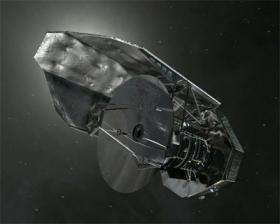A eulogy to Herschel

(Phys.org)—With its 2160 litres of liquid helium about to run out, the Herschel Space Observatory will, by the end of March, become just another piece of space junk.
In January's Physics World, Steve Eales, a University of Cardiff astronomer who leads one of the telescope's largest surveys, explains how this space facility has advanced our understanding of star and galaxy formation.
Sub-millimetre wavelength astronomy—the kind of astronomy that the European Space Agency's Herschel Space Observatory has been undertaking since blast off in May 2009—lets us observe fundamental astronomical events, reaching parts of the universe that optical light cannot.
As Eales writes, "In peering into the big clouds of gas and dust that are the "maternity wards" of stars and then detecting the sub-millimetre light emitted from the dust around the newly formed stars, Herschel is doing much to study star formation, which is one of astronomy's 'big questions'."
Held in place by the gravitational forces between the Earth and the Sun, at some 1.6 million kilometres from us, Herschel has been able to detect faint sub-millimetre radiation from 10 billion years back in time.
Eales remarks on the pace at which our understanding of the universe is advancing thanks to the observatory, which was named after the German-born astronomer William Herschel, who discovered infrared radiation and the planet Uranus, with help from his sister Caroline.
Recalling whole nights spent looking for one new galaxy with its sub-millimetre predecessor—the James Clerk Maxwell Telescope—Eales describes how he recently turned up 7000 new galaxies in barely 16 hours using Herschel data.
The 2160 litres of helium that Herschel blasted off with has kept the observatory cold enough to ensure that the heat given off by its own machinery doesn't confuse its readings.
This March, however, the helium will run out and Herschel will be defunct. But, as Eales writes, "the treasure trove of Herschel data will be picked through by astronomers for years to come".
Journal information: Physics World
Provided by Institute of Physics




















